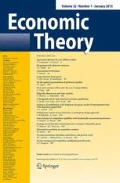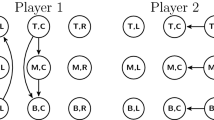Abstract
We provide conditions guaranteeing the existence of Nash equilibrium in games in which players’ preferences can be arbitrary binary relations. Our main result generalizes Reny’s (Economic Theory, forthcoming) existence result for games with ordered preferences and He and Yannelis’ (Economic Theory, forthcoming) existence result for abstract economies with non-ordered preferences.
Similar content being viewed by others
Notes
For an example in the context our paper, see Sect. 6.
Actually, Theorem 1 includes Theorem 4.2 in Reny (2013) when correspondence security is assumed to hold with respect to the entire set of players. It is straightforward to define the notion of correspondence target security with respect to a subset of players and to obtain a corresponding extension of Theorem 1, so that Theorem 4.2 in Reny (2013) is covered without the above additional assumption; see Sect. 7.9.
In the terminology of He and Yannelis (2014), this means that \(P_i\cap A_i\) has the continuous inclusion property at x.
While our definition of the weak continuous inclusion property does not explicitly require such i to belong to I(x), this is of course a consequence of the definition.
Note that the definition of correspondence target security with respect to J does not explicitly require the player for whom conditions (a) and (b) in Definition 5 hold to belong to J. However, this may be shown to be a consequence of the definition.
References
Aliprantis, C., Border, K.: Infinite Dimensional Analysis, 3rd edn. Springer, Berlin (2006)
Allison, B., Lepore, J.: Verifying payoff security in the mixed extension of discontinuous games. J. Econ. Theory 152, 291–303 (2014)
Bagh, A., Jofre, A.: Reciprocal upper semicontinuity and better reply secure games: a comment. Econometrica 74, 1715–1721 (2006)
Balder, E.: An equilibrium closure result for discontinuous games. Econ. Theory 48, 47–65 (2011)
Barelli, P., Meneghel, I.: A note on the equilibrium existence problem in discontinuous games. Econometrica 81, 813–824 (2013)
Bich, P.: Existence of pure Nash equilibria in discontinuous and non quasiconcave games. Int. J. Game Theory 38, 395–410 (2009)
Bich, P., Laraki, R.: A unified approach to equilibrium existence in discontinuous strategic games. Paris School of Economics (unpublished) (2012)
Borglin, A., Keiding, H.: Existence of equilibrium actions and of equilibrium: a note on the ‘new’ existence theorems. J. Math. Econ. 3, 313–316 (1976)
Carmona, G.: An existence result for discontinuous games. J. Econ. Theory 144, 1333–1340 (2009)
Carmona, G.: Understanding some recent existence results for discontinuous games. Econ. Theory 48, 31–45 (2011)
Carmona, G.: Reducible equilibrium properties: comments on recent existence results. Econ. Theory (2014) (forthcoming). doi:10.1007/s00199-014-0842-y
Carmona, G., Podczeck, K.: Existence of Nash equilibrium in games with a measure space of players and discontinuous payoff functions. J. Econ. Theory 152, 130–178 (2014)
de Castro, L.: Equilibria existence in regular discontinuous games. Econ. Theory 48, 67–85 (2011)
Dasgupta, P., Maskin, E.: The existence of equilibrium in discontinuous economic games, I: theory. Rev. Econ. Stud. 53, 1–26 (1986)
Engelking, R.: General Topology, Sigma Series in Pure Mathematics, vol. 6. Heldermann, Berlin (1989)
He, W., Yannelis, N.: Existence of Walrasian equilibria with discontinuous, non-ordered, interdependent and price-dependent preferences. Econ. Theory (2014) (forthcoming). doi:10.1007/s00199-015-0875-x
McLennan, A., Monteiro, P., Tourky, R.: Games with discontinuous payoffs: a strengthening of Reny’s existence theorem. Econometrica 79, 1643–1664 (2011)
Nessah, R.: Generalized weak transfer continuity and Nash equilibrium. J. Math. Econ. 47, 659–662 (2011)
Prokopovych, P.: On equilibrium existence in payoff secure games. Econ. Theory 48, 5–16 (2011)
Prokopovych, P.: The single deviation property in games with discontinuous payoffs. Econ. Theory 53, 383–402 (2013)
Prokopovych, P.: Majorized correspondences and equilibrium existence in discontinuous games. Econ. Theory (2015) (forthcoming). doi:10.1007/s00199-015-0874-y
Reny, P.: On the existence of pure and mixed strategy equilibria in discontinuous games. Econometrica 67, 1029–1056 (1999)
Reny, P.: Further Results on the Existence of Nash Equilibria in Discontinuous Games. University of Chicago (unpublished) (2009)
Reny, P.: Strategic approximations of discontinuous games. Econ. Theory 48, 17–29 (2011)
Reny, P.: Nash Equilibrium in Discontinuous Games. University of Chicago (2013)
Scalzo, V.: On the existence of maximal elements, fixed points and equilibria of generalized games in a fuzzy environment. Fuzzy Sets Syst. 272, 126–133 (2015)
Shafer, W., Sonnenschein, H.: Equilibrium in abstract economies without ordered preferences. J. Math. Econ. 2, 345–348 (1975)
Simon, L.: Games with discontinuous payoffs. Rev. Econ. Stud. 54, 569–597 (1987)
Yannelis, N., Prabhakar, N.: Existence of maximal elements and equilibria in linear topological spaces. J. Math. Econ. 12, 233–245 (1983)
Author information
Authors and Affiliations
Corresponding author
Additional information
We thank Nicholas Yannelis and an anonymous referee for helpful comments. Any remaining errors are, of course, ours.
Rights and permissions
About this article
Cite this article
Carmona, G., Podczeck, K. Existence of Nash equilibrium in ordinal games with discontinuous preferences. Econ Theory 61, 457–478 (2016). https://doi.org/10.1007/s00199-015-0901-z
Received:
Accepted:
Published:
Issue Date:
DOI: https://doi.org/10.1007/s00199-015-0901-z



